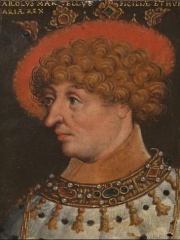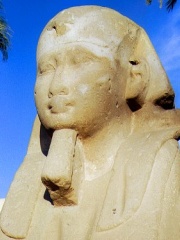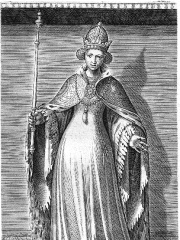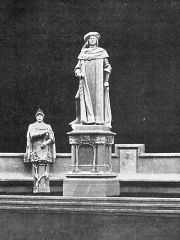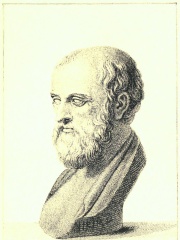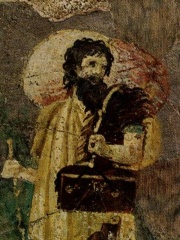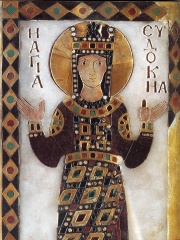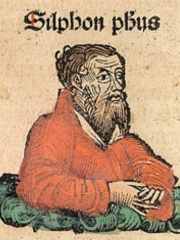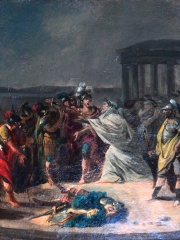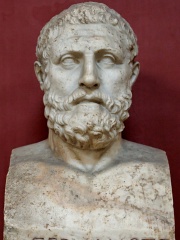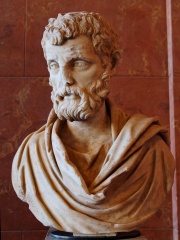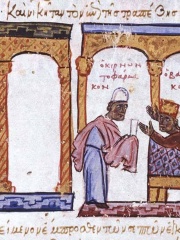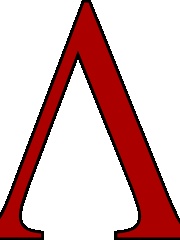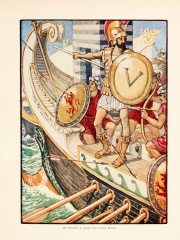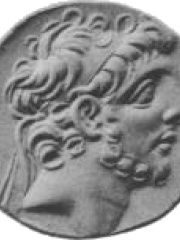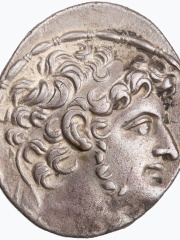POLITICIAN
Telamon
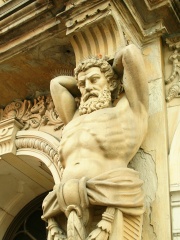
 Telamon
Telamon
In Greek mythology, Telamon (; Ancient Greek: Τελαμών, Telamōn means "broad strap") was the son of King Aeacus of Aegina, and Endeïs, a mountain nymph. The elder brother of Peleus, Telamon sailed alongside Jason as one of his Argonauts, and was present at the hunt for the Calydonian Boar. In the Iliad, he was the father of Greek heroes Ajax the Great and Teucer by different mothers. Some accounts mention a third son of his, Trambelus. Read more on Wikipedia
His biography is available in 41 different languages on Wikipedia. Telamon is the 3,285th most popular politician (down from 2,965th in 2024), the 212th most popular biography from Greece (down from 199th in 2019) and the 81st most popular Greek Politician.
Telamon is most famous for being the father of Ajax.
Memorability Metrics
Page views of Telamon by language
Among POLITICIANS
Among politicians, Telamon ranks 3,285 out of 19,576. Before him are Kolinda Grabar-Kitarović, Ajax the Lesser, Felipe González, Anne Marie Louise d'Orléans, Duchess of Montpensier, Yitzhak Navon, and Chryseis. After him are Charles Martel of Anjou, Nectanebo I, Margaret II, Countess of Hainaut, Alberto Fernández, Frederick I, Elector of Brandenburg, and Charles Emmanuel II, Duke of Savoy.
Most Popular Politicians in Wikipedia
Go to all RankingsKolinda Grabar-Kitarović
1968 - Present
HPI: 69.16
Rank: 3,281
Ajax the Lesser
HPI: 69.16
Rank: 3,282
Felipe González
1942 - Present
HPI: 69.16
Rank: 3,283
Anne Marie Louise d'Orléans, Duchess of Montpensier
1627 - 1693
HPI: 69.16
Rank: 3,284
Yitzhak Navon
1921 - 2015
HPI: 69.16
Rank: 3,285
Chryseis
HPI: 69.16
Rank: 3,286
Telamon
HPI: 69.16
Rank: 3,287
Charles Martel of Anjou
1271 - 1295
HPI: 69.16
Rank: 3,288
Nectanebo I
450 BC - 362 BC
HPI: 69.16
Rank: 3,289
Margaret II, Countess of Hainaut
1311 - 1356
HPI: 69.16
Rank: 3,290
Alberto Fernández
1959 - Present
HPI: 69.16
Rank: 3,291
Frederick I, Elector of Brandenburg
1371 - 1440
HPI: 69.15
Rank: 3,292
Charles Emmanuel II, Duke of Savoy
1634 - 1675
HPI: 69.15
Rank: 3,293
In Greece
Among people born in Greece, Telamon ranks 212 out of 1,024. Before him are Nearchus (-356), Theopompus (-400), Nicias (-500), Crates of Thebes (-365), Aelia Eudocia (401), and Bacchylides (-490). After him are Stilpo (-359), Idomeneus of Crete (null), Erasistratus (-303), Kyriakos Mitsotakis (1968), Periander (-700), and Andreas Papandreou (1919).
Others born in Greece
Go to all RankingsNearchus
MILITARY PERSONNEL
356 BC - 300 BC
HPI: 69.47
Rank: 206
Theopompus
HISTORIAN
400 BC - 320 BC
HPI: 69.44
Rank: 207
Nicias
POLITICIAN
500 BC - 413 BC
HPI: 69.38
Rank: 208
Crates of Thebes
PHILOSOPHER
365 BC - 285 BC
HPI: 69.38
Rank: 209
Aelia Eudocia
WRITER
401 - 460
HPI: 69.36
Rank: 210
Bacchylides
WRITER
490 BC - 451 BC
HPI: 69.29
Rank: 211
Telamon
POLITICIAN
HPI: 69.16
Rank: 212
Stilpo
PHILOSOPHER
359 BC - 279 BC
HPI: 69.16
Rank: 213
Idomeneus of Crete
POLITICIAN
HPI: 69.07
Rank: 214
Erasistratus
PHYSICIAN
303 BC - 249 BC
HPI: 69.05
Rank: 215
Kyriakos Mitsotakis
POLITICIAN
1968 - Present
HPI: 69.03
Rank: 216
Periander
WRITER
700 BC - 583 BC
HPI: 68.98
Rank: 217
Andreas Papandreou
POLITICIAN
1919 - 1996
HPI: 68.96
Rank: 218
Among POLITICIANS In Greece
Among politicians born in Greece, Telamon ranks 81. Before him are Herodes Atticus (101), Theophano (941), Pleistarchus (-500), Brasidas (-500), Gazi Husrev-beg (1480), and Nicias (-500). After him are Idomeneus of Crete (null), Kyriakos Mitsotakis (1968), Andreas Papandreou (1919), Antiochus IX Cyzicenus (-135), Antiochus XI Epiphanes (-115), and Ephialtes (-590).
Herodes Atticus
101 - 177
HPI: 70.05
Rank: 75
Theophano
941 - 976
HPI: 69.81
Rank: 76
Pleistarchus
500 BC - 458 BC
HPI: 69.76
Rank: 77
Brasidas
500 BC - 422 BC
HPI: 69.63
Rank: 78
Gazi Husrev-beg
1480 - 1541
HPI: 69.49
Rank: 79
Nicias
500 BC - 413 BC
HPI: 69.38
Rank: 80
Telamon
HPI: 69.16
Rank: 81
Idomeneus of Crete
HPI: 69.07
Rank: 82
Kyriakos Mitsotakis
1968 - Present
HPI: 69.03
Rank: 83
Andreas Papandreou
1919 - 1996
HPI: 68.96
Rank: 84
Antiochus IX Cyzicenus
135 BC - 95 BC
HPI: 68.83
Rank: 85
Antiochus XI Epiphanes
115 BC - 92 BC
HPI: 68.68
Rank: 86
Ephialtes
590 BC - 461 BC
HPI: 68.68
Rank: 87






